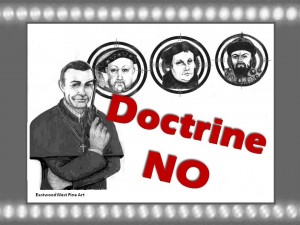October 14, 1066: William of Normandy Saves the English Language From Sounding Too German
This day is the anniversary of the Battle of Hastings. You can commemorate this day by singing this musical tribute to the loser of the battle, the late King Harold Godwinson. (I have borrowed the melody of “Smoke Gets in Your Eyes” so expect the great-grandchildren of Jerome Kern to sue me.)
Harold’s Song
‘Gainst Bill of Normandy,
Anglo-Saxony’s
Bravest earls and thralls
Stood against the Gauls’
Claims to monarchy
When Angle-Saxons strive
They’re allowed to try
Axe or sword for duels,
But they’ll break the rules
Arrowing an eye.
On our side
By this rule we’d abide.
Eye gouging is just done.
But Norse code
Allows that ghastly mode:
Shooting a hole in one.
Now Norman lords deride
Angle-Saxon pride.
What’s more I won’t see
Bayeux’s tapestry
Arrowed in the eye.
And now the pedantics….
On this day in 1066, William the Bastard won the battle of Hastings and improved his nickname. Ironically, the Conqueror could have done just as well in a probate court. William had a better claim to the English throne than the English king did. (Yes, possession is nine tenths of the law; but William’s one tenth included a better army.) The legal wrangling and the bloodshed all stemmed from the inability to the late Edward the Confessor to make up his mind. Who would succeed the childless monarch? Edward apparently promised everyone the throne.
He had promised both his cousin William and his brother-in-law Harold Godwinson. His half-greatnephew Edgar also thought he was in line to the throne. King Edward’s Christmas cards probably read, “You May Already Be a Winner.” Fortunately, few people could read at the time; otherwise there might have been some 200 claimants to the English throne. (That didn’t happen until the 15th century and the Wars of the Roses.)
When Edward died on January 5, 1066, the council of English nobles chose Harold to be the next king. Harold was the most powerful noble in England and he was a distinguished soldier; in fact, Harold had been the de facto ruler during the reign of his ineffectual brother-in-law–whose only real skill apparently was praying. Since he was already doing the work, Harold would seem entitled to the formalities and its perks; besides, why shouldn’t the English have an English king? That would be fair and democratic, and completely anachronistic and wrong.
The council of nobles did not have the right to choose a king. Besides, where did you get the idea that Harold Godwinson was English? Does the name Harold tell you anything? Do real Angle-Saxon names end with “son”? Remember, the Vikings did get around. Eastern England was inundated by the Norse invaders; York was originally pronounced Jorvik. In the 11th century, England already had three Danish kings: Knut, Harold I and Hardicanute. So Mr. Godwinson would have been the fourth.
Being Norwegian and French, William of Normandy felt that he had as much right to the English throne as a Dane. Furthermore, William actually was related to Edward the Confessor. A cousin outranks a brother-in-law, especially when the marriage probably was never consummated. (Edward did have something to confess.) Finally, William could claim to be the overlord of Harold Godwinson. When Godwinson had visited Normandy in 1064, he had received a complimentary knighthood from William. That turned out to be more than a friendly gesture; from a legal perspective, Harold had made himself William’s vassel. Of course, any graduate of Constantinople University (which was the nearest law school in the 11th century) would have found the loophole: Harold only would be a vassal in Normandy, so just stay out of France.
Unfortunately, Harold did not think of hiring a smart Greek lawyer. In fact, he was unrepresented when William went to court. The Norman duke sent a delegation to the Pope, hoping to finagle Rome’s endorsement. Pope Alexander II was very flattered. Few rulers ever showed the Pope any respect–certainly not those imperial thugs in Germany. Alexander was usually preoccupied trying to enforce celibacy on the clergy. But here was a chance to determine the fate of a kingdom. The Pope considered the weight of the Norman’s claims (and bribes); not hearing any English arguments, Alexander decided in William’s favor. So William invaded England, with the blessing and authorization of the Pope.
Having cavalry and God on his side proved decisive for William. While the cavalry was more useful at Hastings, the Pope’s endorsement stifled further opposition from the English. Obedient to Rome, the clergy of London delivered the city to William. Besides, the English were getting used to the idea that their kings would be foreigners.
And they now have had 1000 years of practice.
